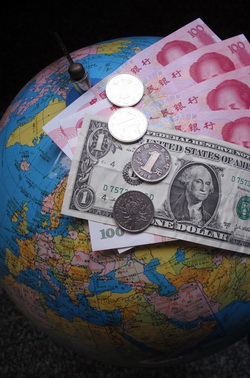Opinion
Internationalized renminbi 'a long way off'
By Tan Kim-eng (China Daily)
Updated: 2010-01-25 08:02
 |
Large Medium Small |
 |
|
Standard and Poor's says Chinese policymakers will gradually make the requisite changes to facilitate cross-border renminbi use. [China Daily] |
Unlike currencies of other large economies - the US dollar, the euro and the yen - the renminbi has been conspicuously absent in international trade or financial transactions. In fact, the currencies of several markedly smaller economies, including those of Australia, Switzerland, and the UK, have achieved much greater prominence in international economic activities.
China's cautious approach to financial and monetary policies largely explains this phenomenon. Although the country has thrown its doors wide open to international trade and direct investment, strict capital controls ensure that its currency is used almost entirely for domestic transactions. Only a small amount of its external trade - mainly with neighbors - is denominated in the Chinese currency.
China seems to have stepped up the pace of financial liberalization despite the international financial market volatility of the past two years. In April 2009, the government announced that it would allow renminbi settlement for specific cross-border trading activities in five coastal cities on a pilot basis. As part of this trial, banks in Hong Kong have been allowed to expand their renminbi commercial banking activities to facilitate trade settlement.
The government has also broadened its experiment to build a renminbi financial system in Hong Kong in other ways. The list of institutions allowed to issue renminbi bonds in Hong Kong was expanded to include the mainland subsidiaries of Hong Kong banks. Previously, only mainland banks were allowed this fund-raising option. In September 2009, the Chinese government itself sold renminbi bonds in Hong Kong for the first time.
Recently, the People's Bank of China also signed bilateral currency swap agreements with the central banks of Argentina, Belarus, Indonesia, Malaysia, and South Korea. Onshore, China has announced measures to deepen domestic bond market developments, such as easing restrictions on the sale of papers in the interbank market and possibly allowing foreign companies to sell renminbi bonds.
A number of governments that issue internationally used currencies are projecting sharply higher debt levels in the next few years. Consequently, there is now a greater risk that large currency depreciations or high inflation in these countries could erode the value of Chinese foreign currency assets. By reducing the foreign exchange exposure of the Chinese economy through increasing the international use of the renminbi, we believe China could limit such risks for Chinese traders, investors, and financial institutions.
Internationalizing the renminbi means, however, that China would have to significantly ease capital controls, in our opinion. With a large pool of renminbi funds abroad, changes in domestic or international market conditions would likely cause strong capital flows. The result could markedly reduce the effectiveness of Chinese monetary or credit policy actions.
Even if China believes that the benefits of currency internationalization outweigh the costs, major hurdles lie ahead. The most important of these is that the renminbi remains non-convertible and subject to strict capital controls. The Chinese market will always be the largest and most liquid market for renminbi funds. If non-residents cannot easily buy and sell the currency and if non-resident financial flows are strictly regulated, the costs and liquidity risks of holding the renminbi would likely deter widespread international use.
The experiences of the euro and Japanese yen suggest a challenging time for renminbi internationalization. Despite highly favorable conditions at its inception, the euro has made little headway in rivaling the international importance of the US dollar outside Europe. Similarly, Japan's significant efforts to internationalize the yen from the 1980s to early 2000s had little lasting impact on the currency's international use. Some analysts attributed this lack of progress to the prolonged economic weakness in Japan.
As with other changes in China, we believe that policymakers will gradually make the requisite changes to facilitate cross-border renminbi use. International confidence in the predictability and transparency of Chinese policies will also take time to build. An internationalized renminbi is still far from reality.
The author is Director of Sovereign and Public Finance Ratings at Standard & Poor's













